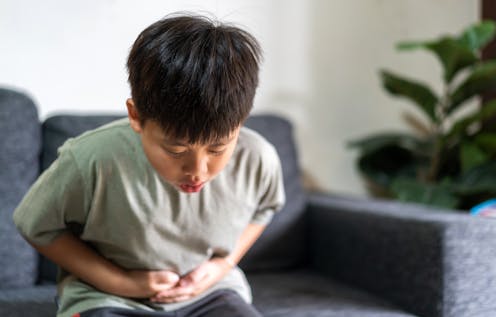what to know as gastro surges among Australian children
- Written by Elizabeth Jane Elliott, Professor of Paediatrics and Child Health, University of Sydney

As a mother, I know the dread of hearing a gastro bug is going around the daycare, school or netball team. Diarrhoea and vomiting can stun a healthy child for days and wreak havoc on a family for weeks.
As a paediatrician, with extensive research experience in acute gastroenteritis (gastro), I also understand the effects on the community, our hospitals and our most vulnerable patients.
In the past year, Australia has experienced a surge in gastro cases due to a bug called cryptosporidium, which particularly affects children.
Cryptosporidium is not the only cause of gastro, but its spread provides a timely reminder to think about what we can do to manage and prevent this nasty illness.
Symptoms and causes
Gastro is characterised by the rapid onset of diarrhoea, or vomiting, or both, which lasts fewer than 14 days. These symptoms may be accompanied by tummy pain, nausea, appetite loss and fever.
Hundreds of strains of different pathogens may infect the gut to cause gastro. Worldwide, viral pathogens (such as rotavirus or norovirus) are the most common cause, but bacterial pathogens (such as Salmonella or E. coli) and parasites (such as Giardia and cryptosporidium) also cause gastro. Traveller’s diarrhoea may involve pathogens rarely seen in Australia, such as typhoid and cholera.
Gastro is usually transmitted from person to person, including through contact with saliva, vomit or faeces. It may also be acquired by ingesting contaminated water or food (food poisoning), swimming in contaminated water (in pools, dams, estuaries or water parks), or contact with farm animals.
What about cryptosporidium?
Cryptosporidium is a relatively common cause of gastro, called cryptosporidiosis. It especially affects young children, but the elderly and people with suppressed immune systems are also vulnerable.
Cryptosporidium is spread by spores called oocysts excreted in the faeces of humans and animals.
People often become infected through ingestion of contaminated water or contact with contaminated water, including in swimming pools.
When the parasite escapes the gut, it may survive in pool or spa water, even if it’s chlorinated, for days. So outbreaks often occur in spring or summer months when children are more likely to be swimming.
We saw this over the summer in Australia, when outbreaks of cryptosporidiosis led to pool closures and general alerts in New South Wales, Victoria and Queensland.
The infection can also be spread from person to person.
Cryptosporidium causes symptoms typical of gastro, notably watery diarrhoea and tummy pain. Fever and vomiting are less common. Symptoms usually begin a few days after infection but may come and go over a few weeks.
Children may be infectious for two weeks. People with poor immune function may carry and shed cryptosporidium (and therefore infect others) for longer.
An upward trend
Data from the National Notifiable Diseases Surveillance System confirms an upward trend in cryptosporidiosis cases across Australia this year. Some 11,860 cases have been recorded so far in 2024, compared with 3,716 during all of 2023.
From February to May, cases were more than ten times higher than the five-year average for that period. Cases have been particularly high in Queensland.
We don’t know the reason for this cryptosporidiosis epidemic, but it may be related to changing weather patterns and extreme weather events, perhaps reflecting climate change.
Rates may be higher in Queensland because more kids swim year-round in a warmer climate.
What to do if your child is sick
The mainstay of managing gastro at home, including cryptosporidiosis, is to prevent and treat dehydration. This can best be achieved by offering frequent drinks of a commercial oral rehydration solution which is formulated to promote absorption of water and electrolytes by the gut and replace fluids lost through diarrhoea and vomiting.
If your child’s symptoms are severe or ongoing and you’re worried, contact a doctor, as it’s possible they may need hospital treatment.
Keep any child with diarrhoea or vomiting away from other children or vulnerable adults and home from daycare, pre-school or school until 24 hours after their symptoms have resolved. Parents, child-care workers and teachers are also at risk of infection and should isolate if symptomatic.
If your child has had cryptosporidiosis, they should not swim in a public pool for at least two weeks after the diarrhoea has stopped. Likewise, don’t share towels, linen or utensils with them during this period.
Simple measures can go a long way
To prevent gastro generally, the approach is similar regardless of the pathogen. Some worthwhile precautions include:
don’t drink untreated water from tanks, bores or wells
don’t eat or drink unpasteurised milk or dairy products
wash all fruit and vegetables before eating raw
wash your hands with soap for at least 20 seconds, particularly after changing nappies, using the bathroom, gardening, before preparing food or drinks, or after contact with animals
follow local advice and avoid swimming at beaches and in other waterways after heavy rain or flooding, as run-off and sewage overflow may result in contamination.
make sure your child is vaccinated against rotavirus.
Gastro is a global problem
Despite advances in diagnosis (improved identification of gut pathogens), prevention (notably rotavirus vaccination), and treatment (particularly use of oral rehydration therapy), gastro remains a major cause of illness and death in young children, particularly in developing countries.
According to the World Health Organization, each year there are nearly 1.7 billion cases of diarrhoeal disease in children globally.
It’s worth taking extra care when travelling, especially to low- and middle-income countries where food and water may be less safe. Take advice from your doctor regarding appropriate vaccination for specific destinations, such as for cholera or typhoid.
Authors: Elizabeth Jane Elliott, Professor of Paediatrics and Child Health, University of Sydney



















